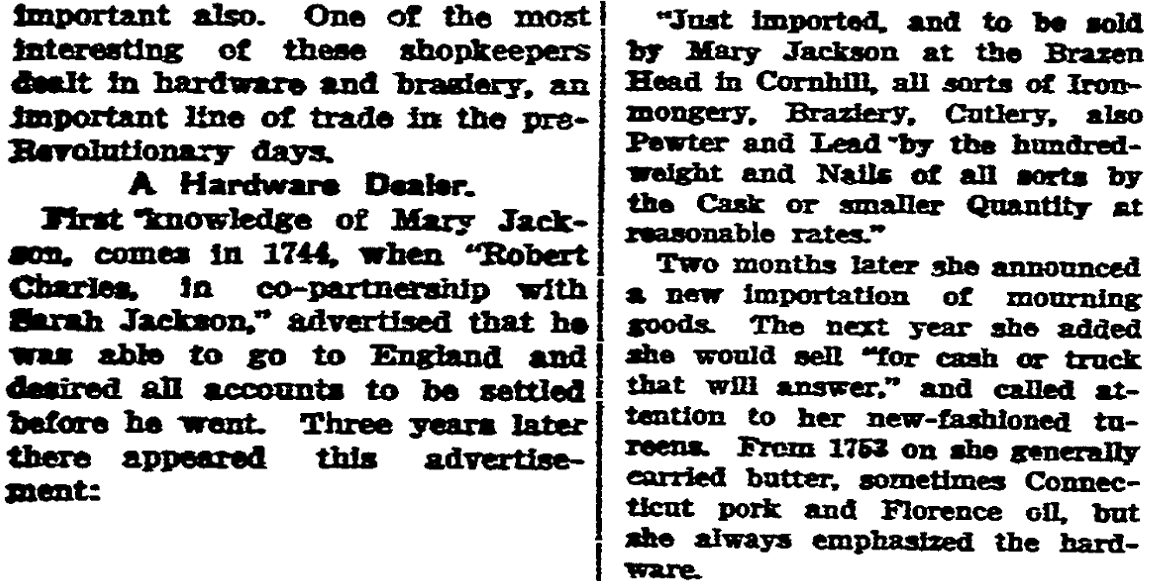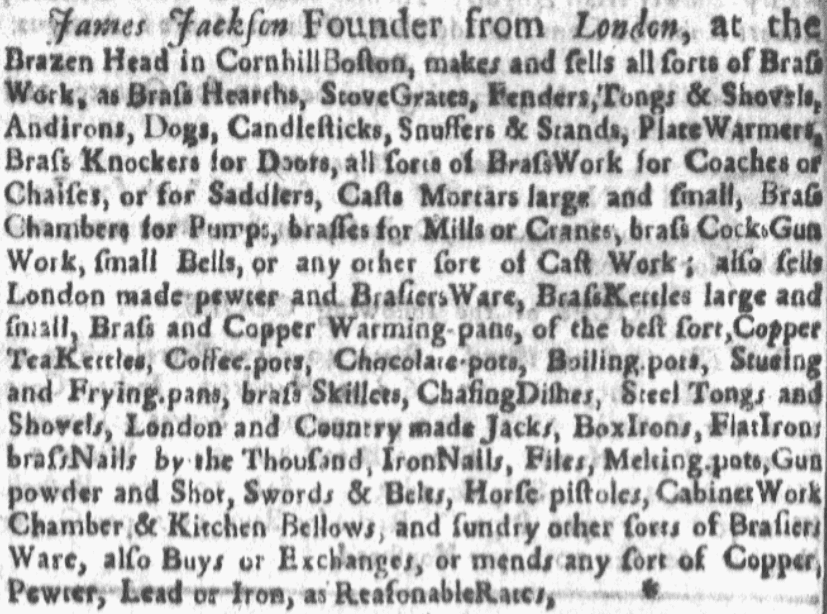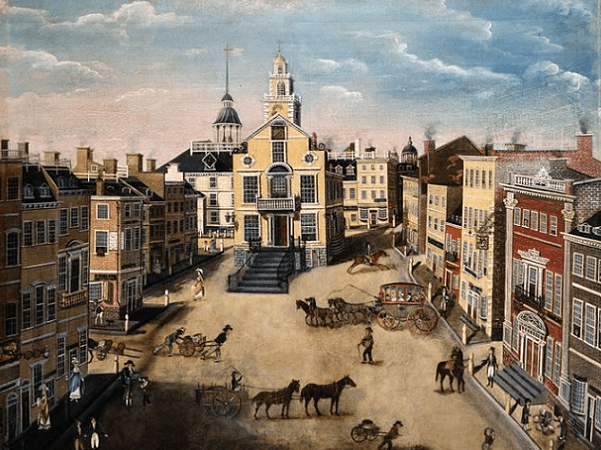Introduction: In this article, Melissa Davenport Berry continues her series about women in colonial America who ran businesses and took out newspaper ads to promote them, focusing here on Mary Jackson. Melissa is a genealogist who has a website, americana-archives.com, and a Facebook group, New England Family Genealogy and History.
During colonial America, women shopkeepers of all sorts were numerous in Boston, Massachusetts, and old newspapers are loaded with their advertisements. According to the States Times Advocate newspaper article below, some colonial newspapers contained almost as many women among the advertisers as men.
One of the most interesting was Mary Jackson, “she merchant,” a popular “brazier” (seller of brass hardware), an important line of trade prior to the American Revolution. I found many ads for Mary, who operated both solo and with partners. London products made her rich and popular, until British finery was boycotted. Her store and family reputation were later tarnished by scandal and misfortune.

The roots of this hardware enterprise begin with Mary’s husband James Jackson, owner of the Brazen Head shop in Cornhill (Washington Street), Boston, located opposite Williams Court, in the center of town. I came across several of the shop’s advertisements (1731-1735) in GenealogyBank’s Historical Newspaper Archives. James had several apprentices and workers who would venture out on their own. William Coffin, brazier, was among them.

According to sources, Mary was always the queen bee at the Brazen Head. After James died, she continued the business at the same location with great energy and success. I found this ad in the Boston Gazette:
“MARY JACKSON, the Widow of the late James Jackson, Founder at the Brazen Head in Cornhill, Boston, sells all sorts of Founders Ware, and all sorts of bright Braziers Ware, and likewise Casteth [casts] all sorts of Mill Brasses.”
Mary and James had two sons: William (b. 1731) and James Jr. (b. 1735), and both played an instrumental role in the merchant business.
One year later, this ad shows that Mary’s business had grown. She sold an expanded inventory of “all sorts of Brass and Founders Ware,” as well as “all sorts of Mill Brasses.” Also, she sold brown paper and purchased “old Copper, Brass, Pewter, Lead and Iron.”
By 1755 Mary had expanded her enterprise further, now selling gun powder, shot, and flints in addition to more brass items. She was also offering: “A Parcel of choice Connecticut Pork, cheap for the Cash, or exchange for Rum, Sugar or Molasses.”
By 1758 Mary had formed a partnership with her son William. An ad appeared in the Boston News-Letter that featured an assortment of London and Bristol wares. There are numerous products listed: swords, warming pans, snuff boxes, belt buckles, thimbles, etc. The final line of the ad explained that: “Old Brass, Copper, Pewter, Lead and Bees-Wax taken in Exchange the same as Cash.”
On 20 March 1760, a fire ignited in Mary’s house and shop, and spread through the streets. The damage was catastrophic. It raged for two days, destroyed 349 buildings and left over 1,000 people homeless. The Boston Evening-Post reported:
“…the 20th of this inst. March will be a day memorable for the most terrible fire that has happened in this town or perhaps any other part of North-America, far exceeding that of Octob. 2, 1711, till now termed the great fire. It began about two o’clock in the morning, in the dwelling house of Mrs. Mary Jackson and Son, at the Brazen Head in Cornhill, but the accident which occasioned it is yet uncertain.”
Mary made a shopping trip to London in 1767. When Tory Mary returned to Boston her saga heated up. The Sons and Daughters of Liberty boycotted her shop and Mary rented rooms to British officers – one was Captain Thomas Preston.
Stay tuned!
Note: Just as an online collection of newspapers, such as GenealogyBank’s Historical Newspaper Archives, told Mary Jackson’s story in colonial America, they can tell you stories about your ancestors that can’t be found anywhere else. Come look today and see what you can discover!
Explore over 330 years of newspapers and historical records in GenealogyBank. Discover your family story! Start a 7-Day Free Trial
Further Reading:
- “The Late Company of Jackson and Charles.” 1775 Blog, J. L. Bell.
- Dexter, Elizabeth Anthony Williams. “Colonial Women of Affairs: A Study of Women in Business and the Professions in America before 1776.” University of California, 1924.
- “Sufferers from the Great Boston Fire of 1760.”1775 Blog, J. L. Bell.
- 1775 Blog. “At the Brazen Head in Cornhill, Boston.”
- Newspapers and Periodicals. American Antiquarian Society, Worcester, Massachusetts.
- Elizabeth Murray Project, California State University, Long Beach.
Related Articles:
